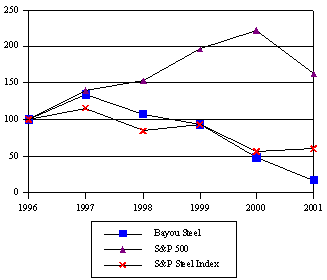COMPENSATION COMMITTEE REPORT
ON EXECUTIVE COMPENSATION The Company’s executive compensation program is designed to attract, retain, reward, and motivate executive management talent required to achieve its short and long-term business objectives, maintain its competitive position in the steel minimill industry, and increase stockholder value. This program is administered and effected by the Company’s management and monitored and approved by the Compensation Committee of the Board of Directors which is comprised of outside directors of the Company. General. In fiscal 1998, as the Company has done periodically, the Company engaged an independent compensation consultant to review the competitiveness of its total executive compensation package. Total compensation includes base pay, annual incentive pay, and long-term incentives. The consultant, with management participation, selected a peer group of publicly traded companies in the steel industry with revenues approximately the same as the Company. The consultant then reviewed compensation of comparable executive positions in the peer group over a three year period. The consultant also collected survey compensation data from published surveys, including steel manufacturers and related companies. Based on this, the consultant determined a target level of total compensation for each of the Company’s executive officers. The report of the independent consultant, which was presented to the Compensation Committee and subsequently accepted by the Board of Directors, made recommendations intended to maintain total executive compensation at a competitive level. The Compensation Committee has basically used this approach as its compensation policy since 1994, although certain subjective elements, including individual performance, scope of responsibilities, and unusual activities, such as acquisitions and financing transactions, are also considered. Base Pay. Salaries of the Company’s executive officers, other than the Chief Executive Officer, are determined by the Chief Executive Officer within the general compensation guidelines developed by the independent consultant and adopted by the Compensation Committee. Based on the study of the peer group of steel minimills, base salaries are targeted at the median level of salaries in the peer group. Besides maintaining competitive market levels, subjective criteria, such as the impact the executive has on the Company, the skills and experience required by the job, individual performance, and internal equity are considered in determining salary levels. Adjustments to salaries are reviewed and approved by the Compensation Committee. Due to the severe market conditions, no adjustments were made in fiscal 2001. Annual Incentive Pay. A significant portion of the potential compensation of the Company’s executive officers consists of an annual incentive cash bonus. The Compensation Committee believes that incentive compensation provides the best means of motivating and rewarding performance while providing necessary controls on cost. The Company has instituted an Incentive Compensation Plan (the “ICP”) to provide annual cash incentives for the attainment of corporate financial objectives to all executive officers, except the Chief Executive Officer. The Administrative Committee, composed of the Chief Executive Officer, Mr. Meyers, and the President, Mr. Pitts, as appointed by the Compensation Committee, determines quantitative measures of financial performance or other indicators of performance for the Company and measurable individual goals each year. The Administrative Committee reviews these measures with the Compensation Committee as to appropriateness. The ability of the Company’s executive officers to earn incentive bonuses under the ICP is dependent upon the Company’s achievement of certain percentage levels of return on assets (the “ROA”) using the historical ROA experience of a group of peer competitors. ROA is defined as the ratio of income before net interest, tax, depreciation, and amortization to defined assets. If the threshold level below which no incentives would be paid is exceeded, the cash incentive bonuses incrementally increase based upon specified ROA levels pre-established by the Administrative Committee. Since the threshold level for ROA percentage was not reached, awards were not paid under the ICP for fiscal 2001. Additionally, the Compensation Committee can award discretionary awards based on unusual circumstances. None of the executives was designated for such a discretionary award. 12 |

